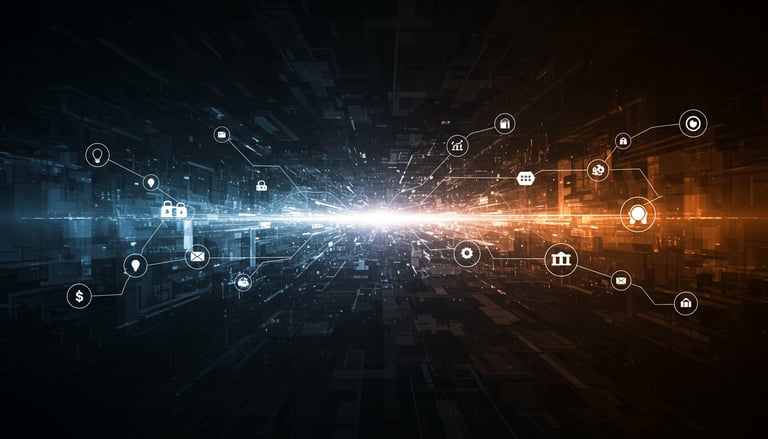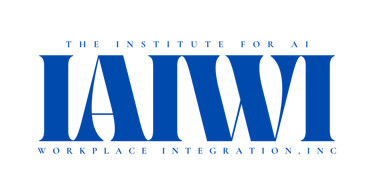How AI in the Workplace is Transforming Business Operations Across the USA
In today’s fast-paced world, artificial intelligence is not just a buzzword; it's transforming the way we work, collaborate, and even think about our jobs. Let’s dive in and explore how this tech is reshaping our work environments and what it means for the future of our careers!
IAIWI - Content Team with AI
7 min read


Welcome to our blog post about "AI in the Workplace." In today’s fast-paced world, artificial intelligence is not just a buzzword; it's transforming the way we work, collaborate, and even think about our jobs. From automating mundane tasks to providing insights that help us make better decisions, AI is changing the game for businesses of all sizes. In this post we will explore how this technology is reshaping our work environments and what it means for the future of our careers!
AI's role in automating routine tasks is nothing short of revolutionary. In today’s fast-paced workplace, where time is of the essence, integrating AI at work allows companies to streamline operations and eliminate mundane responsibilities. For instance, tasks such as data entry, scheduling meetings, and managing emails can be effectively handled by AI tools, freeing employees to focus on more strategic initiatives. This not only enhances efficiency but also empowers employees to channel their creativity. When you think about it, why waste precious hours on repetitive tasks when AI can handle them in a fraction of the time? Moreover, implementing AI in routine workflows can significantly reduce human error. With algorithms designed to follow precise instructions, AI can ensure that data is entered accurately and consistently, minimizing the chances of mistakes that can lead to costly repercussions. This reliability builds trust within teams and allows them to collaborate more effectively. It’s exciting to see how organizations are leveraging AI to automate tasks, as it paves the way for more innovative approaches to problem-solving and project management. As businesses continue to adopt AI technologies, the landscape of work is evolving. Companies that embrace these tools often report not just improved productivity but also higher employee satisfaction. When employees no longer have to slog through tedious tasks, they tend to feel more fulfilled and engaged in their work. So, AI isn’t just changing how work gets done; it’s transforming the overall workplace culture into one that values innovation and creativity.
The Role of AI in Automating Routine Tasks
Employee productivity is being transformed by AI tools that simplify workflows and enhance collaboration. When you integrate AI at work, you're not just adding another gadget to the toolkit; you're revolutionizing how tasks are approached. For example, AI-driven project management tools can analyze team workloads and deadlines, offering real-time suggestions for prioritization. This proactive approach means that employees can focus on what truly matters while AI handles the nitty-gritty details—talk about a game changer!
Another significant benefit of using AI at work is the ability to tailor personal work experiences. AI tools can analyze individual work habits and suggest personalized productivity strategies. Imagine having a virtual assistant that knows when you’re most productive and can schedule your most challenging tasks during that time. This level of customization can lead to a more engaged workforce, where employees feel that their unique needs are being met. The result? A happier, more productive team that’s ready to tackle anything.
Furthermore, AI tools can facilitate seamless communication among team members. Whether it's through chatbots that answer FAQs or automated meeting schedulers, these technologies help eliminate bottlenecks in communication. When information flows freely, collaboration flourishes. This interconnectedness not only boosts team morale but also enhances overall project outcomes. By enhancing employee productivity, AI tools are proving to be indispensable assets in today’s competitive work environment.
Enhancing Employee Productivity with AI Tools
AI and Decision-Making: Data-Driven Insights
When it comes to decision-making, AI is like having a crystal ball that provides data-driven insights. In a world overflowing with information, sifting through data to make informed choices can be daunting. But, with AI at the helm, businesses can quickly analyze vast amounts of data and extract actionable insights. Imagine a marketing team using AI to identify consumer trends based on real-time data—this allows them to pivot their strategies almost instantly. It’s all about making smarter decisions faster, and AI excels in that arena.
Moreover, the integration of AI in decision-making processes leads to a more evidence-based approach. Instead of relying solely on gut feelings or anecdotal evidence, businesses can back their strategies with data. This creates a culture of accountability, where decisions are made based on solid proof rather than conjecture. Employees feel more confident in their choices, knowing they’re guided by robust analytics. It’s a shift that not only enhances performance but also drives innovation, as teams are encouraged to experiment and iterate based on data insights.
Additionally, AI can help predict future trends by analyzing historical data patterns. This predictive capability is invaluable for strategic planning. Companies can anticipate market shifts, consumer behavior changes, and even potential risks. By leveraging these insights, organizations can stay ahead of the curve, ensuring they’re not just reacting to changes but proactively shaping their future. In essence, AI transforms decision-making from a reactive process into a strategic advantage, redefining how businesses operate in today’s dynamic landscape.
The Impact of AI on Workforce Dynamics
The advent of AI in the workplace is reshaping workforce dynamics in ways we’re just beginning to understand. As organizations incorporate AI into their operations, they’re not only changing how work is performed but also who performs it. Many routine jobs are being automated, which can lead to job displacement. However, it's crucial to recognize that AI also creates new roles focused on managing and interpreting AI technology, requiring a shift in skill sets. This evolving landscape compels employees to adapt, fostering a culture of continuous learning and development.
Moreover, the implementation of AI can enhance collaboration across diverse teams. AI tools facilitate communication and streamline project management, enabling teams to work together more effectively, regardless of their physical locations. Virtual collaboration has become the norm, and AI solutions help bridge the gaps, allowing teams to share insights and resources seamlessly. This interconnectedness not only boosts productivity but also cultivates a sense of community among employees, even in remote settings. The impact of AI on workforce dynamics is profound, encouraging a more integrated and collaborative approach to work.
However, as with any significant change, there are challenges to navigate. Employees may feel apprehensive about AI taking over their jobs, leading to resistance or fear of change. It's essential for organizations to communicate the benefits of AI clearly and involve employees in the integration process. By fostering an open dialogue and providing support, companies can alleviate concerns and create a more positive environment for adopting AI technologies. Embracing this change can lead to a more dynamic and responsive workforce, ready to tackle the challenges of the future.
Ethical Considerations in Implementing AI
Diving into the world of AI comes with its fair share of ethical considerations that organizations must address. As businesses begin to implement AI technologies, they need to think critically about issues like data privacy and bias. After all, AI systems learn from data, and if that data is flawed or biased, it can lead to unfair outcomes. Ensuring fairness and transparency in AI algorithms is vital to maintaining trust among employees and customers alike. Companies must establish guidelines to ensure that AI tools are used ethically, safeguarding against potential pitfalls.
Moreover, the ethical implications of AI extend to job displacement and workforce equity. As AI automates more tasks, there’s a real concern about the future of jobs. Organizations must be proactive in addressing these concerns by focusing on reskilling and upskilling their employees. It’s essential to create pathways for workers to transition into new roles that leverage their skills in tandem with AI technologies. By prioritizing employee development, companies can foster a culture that embraces change rather than fears it, ensuring that everyone can thrive in an AI-driven landscape.
Additionally, as AI systems become more integrated into workplace decision-making, accountability becomes paramount. Organizations need to establish clear lines of responsibility regarding AI-driven outcomes. Who is accountable when an AI tool makes a mistake? By addressing these ethical dilemmas head-on and creating frameworks for responsible AI use, companies can position themselves as leaders in their industries. It’s all about balancing innovation with a commitment to ethical practices, ensuring that the implementation of AI benefits everyone involved.
Training and Upskilling Employees for an AI-Driven Future
Preparing employees for an AI-driven future is not just a nice-to-have; it’s essential for organizational success. Companies need to prioritize training and upskilling initiatives that equip their workforce with the knowledge and tools necessary to work alongside AI technologies. This proactive approach involves offering workshops, online courses, and hands-on training that demystify AI and its applications. When employees feel confident in their ability to leverage AI at work, they’re more likely to embrace the change and contribute positively to the organization.
Additionally, fostering a culture of continuous learning is key in an AI-centric workplace. As AI technologies evolve rapidly, so too must the skills of the workforce. Organizations should encourage employees to adopt a growth mindset, where they view learning as an ongoing journey rather than a one-time event. By creating opportunities for professional development and collaboration, businesses can inspire employees to stay ahead of the curve. This commitment to growth not only enhances individual capabilities but also strengthens the organization as a whole.
Moreover, it’s vital for companies to involve employees in the conversation about AI integration and training. By soliciting feedback and understanding their concerns, organizations can tailor their training programs to meet real needs. This inclusive approach fosters a sense of ownership among employees, making them feel valued and empowered. As businesses invest in their people, they build a more resilient workforce prepared to navigate the challenges and opportunities of an AI-driven future. Ultimately, the success of AI in the workplace hinges on the capabilities and confidence of the employees who wield it.
Conclusion
In summary, AI is reshaping the workplace by automating mundane tasks and boosting productivity through intelligent tools. For employers, it’s an opportunity to enhance efficiency and make data-driven decisions, while employees can focus on higher-value work and innovation. However, as we embrace this transformation, both employers and employees must consider the evolving workforce dynamics and the ethical implications of AI. Employers have a responsibility to invest in training and upskilling programs, and employees must proactively adapt to thrive in an AI-driven future. Together, we can harness the power of AI to create a workplace that is not only more efficient but also more equitable and forward-thinking. Are you ready to unlock the full potential of AI for your organization or career? Contact us today to learn more about our research, workforce development initiatives, and AI advocacy efforts. Whether you’re an employer looking to future-proof your business or an employee aiming to stay ahead of the curve, we’re here to guide you. Let’s shape the future of work together—reach out now to get started!
COOKIES DISCLAIMER: This website uses cookies to provide necessary site functionality and to improve your experience. By using this website, you agree to our use of cookies.. Affiliate Disclaimer: The content provided on this platform is for edutainment purposes only and remains the sole property of its respective owners or sources. IAIWI participates in multiple affiliate programs and may earn a commission from purchases made through affiliate links. By purchasing through these links, you enable IAIWI to fulfill its mission to research, educate, develop, and advocate for the ethical, appropriate, and meaningful use of AI in the workplace. Your support is greatly appreciated and does not affect the cost to you.
Empowering workplaces through AI.
Connect
Support
info@iaiwi.org
+1 (407) 624-0700
© 2025 All rights reserved.


220 North Kirkman Rd. | Ste. B | Orlando | FL | 32811
